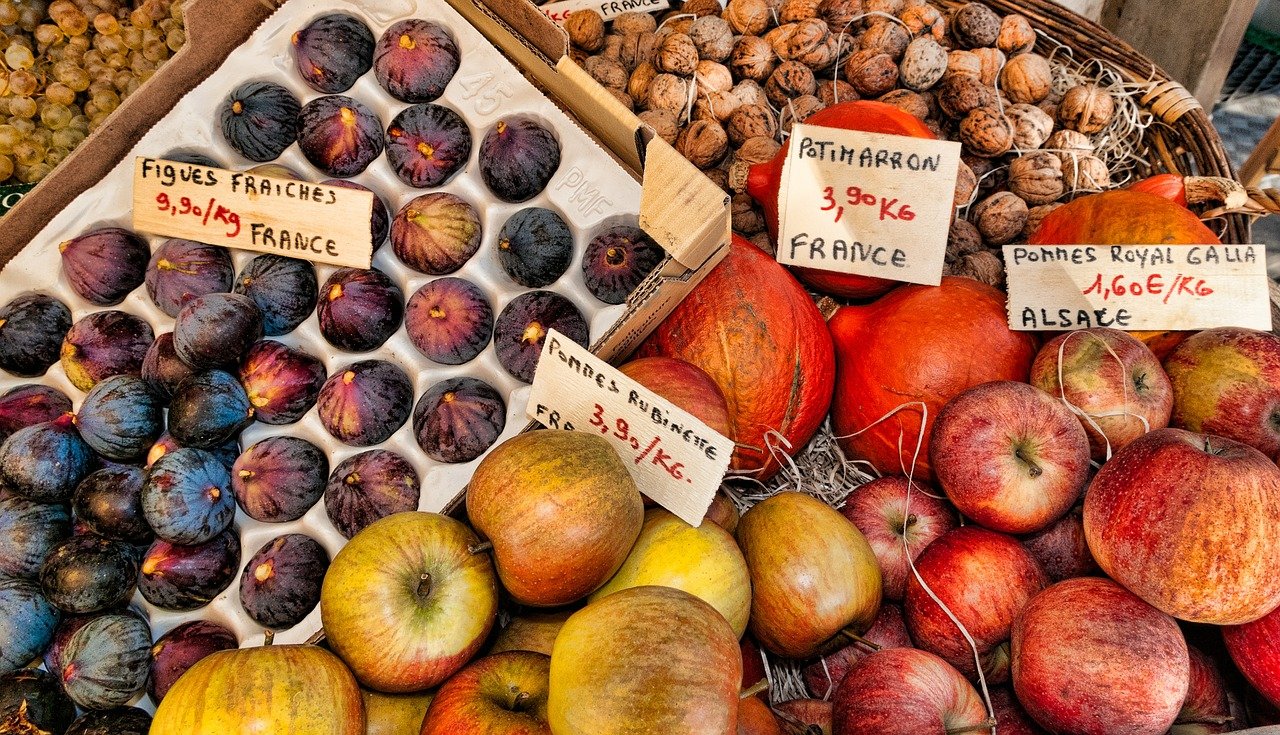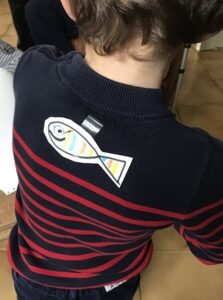La Nourriture: Basic French Food Vocabulary
In this post we’ll build your French vocabulary by learning about everyone’s favorite language topic: French food terms! French food vocabulary will come in handy no matter why you’re learning French, so let’s dig in.
J’ai faim ! I’m hungry!
Let’s start to build your French vocabulary by learning some expressions that you’ll probably need to know when you use French food vocabulary.
- J’ai faim.
I’m hungry. - J’ai soif.
I’m thirsty.
- Je veux manger quelque chose.
I want to eat something. - Je veux boire quelque chose.
I want to drink something. - Je mangerais bien un petit morceau.
I feel like a snack.
Le dîner est prêt ! Dinner is ready!
You probably want to know how to talk about meals when you’re using French food terms. The meals in French are le petit déjeûner breakfast, le déjeûner lunch, and le dîner dinner. A snack is un morceau, literally a piece. And dessert is le dessert. Let’s put that French vocabulary to work in some practical examples.
- Qu’est-ce qu’il y a pour le petit déjeûner ?
What’s for breakfast? - Qu’est-ce qu’il y a pour le déjeûner ?
What’s for lunch? - Qu’est-ce qu’il y a pour le dîner ?
What’s for dinner? - Qu’est-ce qu’il y a pour le dessert ?
What’s for dessert? - Je prends mon petit déjeûner tôt.
I eat breakfast early. - Je déjeûne avec des collègues.
I eat lunch with colleagues. - Je dîne avec ma famille.
I eat dinner with my family.
Qu’est-ce que tu manges ? What are you eating?
Now let’s see some basic French vocabulary related to foods and beverages. We’ll divide these French food terms into sections.
- le pain bread
- le riz rice
- les pâtes (f.) pasta
- les nouilles (f.) noodles
- la viande meat
- le poulet chicken
- le bœuf beef
- le porc pork
- le jambon ham
- l’agneau (m.) lamb
- le poisson fish
- les fruits de mer seafood
- la crevette shrimp
- le crabe crab
- le homard lobster
- le calamar squid
- la palourde clam
- la moule mussel
- l’huître oyster
- la coquille Saint-Jacques scallop
- le tofu tofu
- les légumes (m.) vegetables
- la tomate tomato
- l’onion (m.) onion
- l’ail (m.) garlic
- la laitue lettuce
- les épinards (m.) spinach
- les asperges (f.) asparagus
- le chou cabbage
- le champignon mushroom
- le concombre cucumber
- le poivron pepper (as in bell)
- le piment rouge chili pepper
- le fruit fruit
- la pomme apple
- la poire pear
- la pêche peach
- l’orange (f.) orange
- le citron lemon
- le raisin grape
- la fraise strawberry
- la banane banana
- la noix nut
- la cacahuète peanut
- la graine seed
- le blé wheat
- les céréales (f.) cereal
- le sel salt
- le poivre pepper
- le sésame sesame
- le miel honey
- la sauce soja soy sauce
- le sucre sugar
- l’œuf (m.) egg
- le lait milk
- le fromage cheese
- le beurre butter
- l’eau (f.) water
- le thé tea
- le café coffee
- le vin wine
- la bière beer
- le soja soy milk
- la glace ice cream
- le gâteau cake
- la tarte pie
- le biscuit/cookie cookie
- le bonbon candy
- manger to eat
- boire to drink
- cuisiner/cuire, faire la cuisine to cook
- goûter to taste
- Je mange beaucoup de riz.
I eat a lot of rice. - Tu bois du thé ou du café le matin ?
Do you drink tea or coffee in the morning? - Tu cuisines très bien ! / Tu fais très bien la cuisine !
You cook very well!
Une serviette, s’il vous plaît. A napkin, please.
Now that you know some basic French food vocabulary, let’s see some phrases that will come in handy when you’re ordering food. Some vocabulary related to French food terms is: une assiette plate, un bol bowl, un couteau knife, une cuillère spoon, une fourchette fork, des baguettes chopsticks, une tasse cup, un verre glass, une serviette napkin.
- Où sont les fourchettes, les couteaux, et les cuillères ?
Where are the forks, knives, and spoons? - Les fourchettes, les couteaux, et les cuillères sont dans le tiroir.
The forks, knives, and spoons are in the drawer. - Les verres propres sont dans le placard.
The clean glasses are in the cabinet. - Les tasses à café sont sur l’étagère.
The coffee cups are on the shelf. - Puis-je avoir une serviette, s’il vous plaît ?
Could I have a napkin, please? - Mettez les assiettes propres dans le placard, s’il vous plaît.
Please put the clean plates in the cabinet.
Ça se passe bien ? How’s your food?
Let’s close with some French vocabulary that you can use to talk about your food: délicieux delicious, salé salty, sucré sweet, amère bitter, acide sour.
- C’est délicieux.
It’s delicious. - C’est super.
It’s great. - La nourriture est excellente.
This food is excellent. - C’est trop chaud.
It’s too hot. - C’est trop froid.
It’s too cold. - C’est trop sucré.
It’s too sweet. - C’est trop salé.
It’s too salty. - Ça n’a pas de goût.
It’s tasteless/bland. - C’est trop cuit.
It’s overcooked. - Ce n’est pas assez cuit.
It’s undercooked. - C’est gras.
It’s oily/greasy.
Do you want to learn French?
We hope you’ve enjoyed building your French vocabulary by learning some basic French food vocabulary. heck out our other posts on French language, culture, and more. And if you’re looking for convenient and affordable live French lessons with a real teacher, check out The Language Garage. Our lessons are given online in a virtual classroom, so it doesn’t matter where you live or work. We can come to you. And we have flexible options, with a free trial so that you can decide if there’s a fit. Check us out!
Image: babawawa on Pixabay






